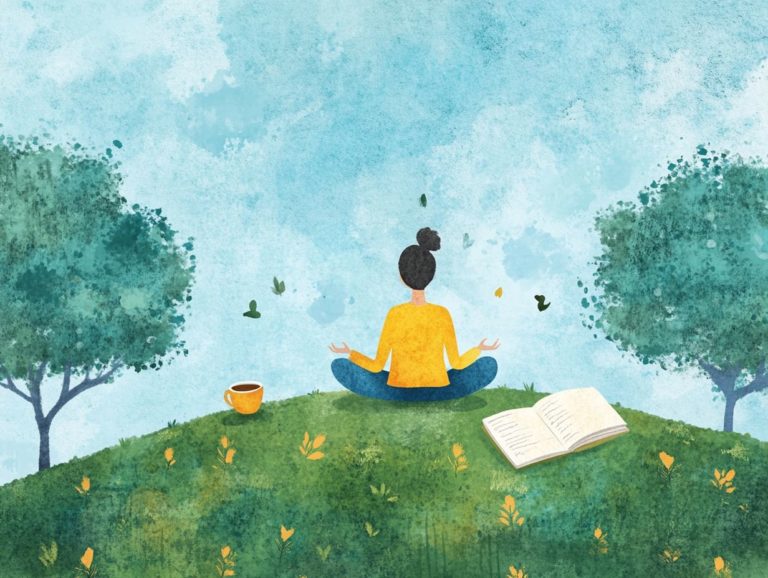What is the Connection Between Mindfulness and Discipline?
Contents
- Introduction
- Key Takeaways:
- What is Mindfulness?
- What is Discipline?
- How Does Discipline Help in Achieving Goals?
- How Can Mindfulness Help with Discipline?
- How Does Being Mindful Improve Self-Control and Impulse Regulation?
- What Are Some Mindfulness Techniques for Building Discipline?
- How Can Discipline Enhance Mindfulness?
- 1. Establishing a Routine
- 2. Setting Goals and Sticking to Them
- 3. Practicing Self-Discipline in Daily Activities
- Frequently Asked Questions
- What is the Connection Between Mindfulness and Discipline?
- How does mindfulness improve discipline?
- Can discipline help with mindfulness?
- In what ways can mindfulness and discipline complement each other?
- How can the combination of mindfulness and discipline benefit my mental well-being?
- Are there any practical tips for incorporating mindfulness and discipline into daily life?
Introduction
In today s fast-paced world, striking a balance between mindfulness, discipline, and inner peace may feel daunting.
However, it remains essential for your personal growth and self-improvement.
This article delves into the important connection between these two influential concepts, illuminating the true essence of mindfulness and its numerous advantages, including health benefits and self-compassion. You ll gain a clear understanding of what discipline entails and the vital role it plays in achieving your goals, fostering personal integrity and emotional well-being.
Let s dive into practical strategies for seamlessly integrating mindfulness into your daily routine and intentional living, and discover how discipline practices can deepen and enrich your mindfulness practice and overall life balance.
Key Takeaways:
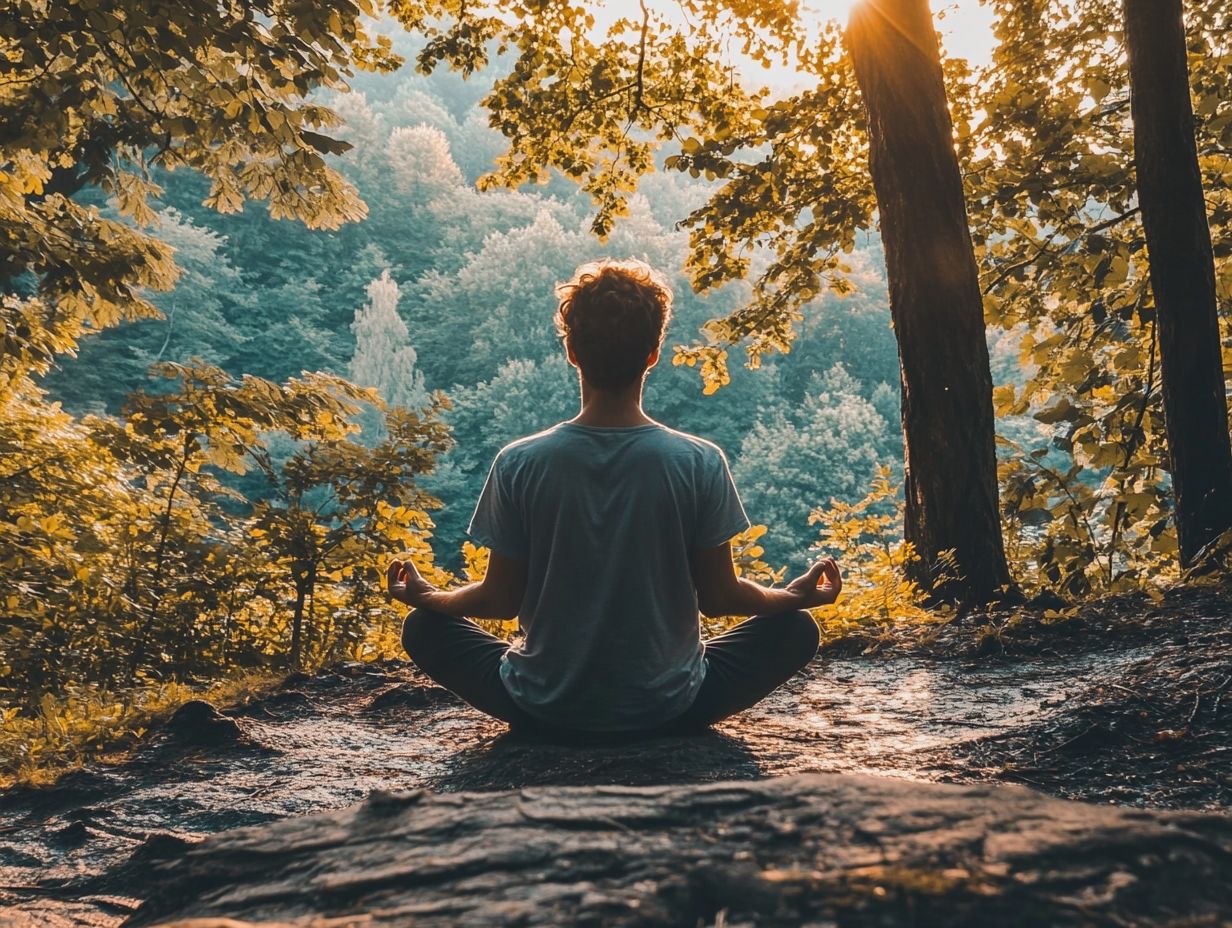
- Mindfulness can improve self-control and help overcome procrastination.
- Discipline can enhance mindfulness by establishing a routine and setting and sticking to goals.
- Mindfulness and discipline work together to improve focus, concentration, and self-discipline in daily activities.
What is Mindfulness?
Mindfulness is the art of nurturing a moment-by-moment awareness of your thoughts, feelings, bodily sensations, and the world around you, underscoring the essential practice of being fully present.
This approach deepens your connection with your emotional and mental states, enabling you to cultivate self-discipline, regulate your emotions, and lead a more compassionate life as you navigate your daily routines and interactions.
Research, including studies from Oxford University, emphasizes the profound impact mindfulness can have on enhancing your mental health, fostering emotional resilience, and refining your decision-making skills.
What Are the Benefits of Practicing Mindfulness and Meditation?
Practicing mindfulness and meditation presents you with a myriad of benefits, including enhanced emotional well-being, improved mental health, and effective stress management. These advantages can profoundly influence your daily life and relationships by promoting healthy habits and emotional regulation.
Mindfulness encourages positive change by sharpening your focus, enhancing emotional regulation, and equipping you with coping strategies, all while anchoring you in the present moment. By embracing these benefits, you cultivate healthy habits and build emotional resilience, empowering you to navigate life s challenges with greater ease and achieve a sense of inner peace.
Research from experts such as Mark Williams reveals that mindfulness not only diminishes daily stress levels but also boosts overall cognitive performance, concentration, and communication skills. When you engage in mindfulness practices, you often experience heightened clarity and creativity qualities that can prove invaluable in both personal and professional arenas.
Studies indicate that these practices assist in regulating emotions, leading to a more balanced and optimistic outlook on life, enhancing both your self-discipline and emotional intelligence.
As you weave mindfulness into your daily routine and develop coping strategies, you foster deeper connections with yourself and those around you, ultimately enhancing both your productivity and emotional intelligence, while also reaping mental health benefits.
What is Discipline?
Discipline is your capacity to master your impulses, emotions, and behaviors, empowering you to stick to healthy habits and reach your goals through consistent effort. This self-discipline means having control over your actions, helping you stick to your plans.
Discipline is intricately linked to your willpower, personal integrity, and emotional management; it s about making choices that resonate with your aspirations and values, even when faced with temptation or adversity.
It serves as a vital component of emotional management and personal growth, allowing you to nurture habits that enhance your mental health, emotional regulation, and overall well-being.
How Does Discipline Help in Achieving Goals?
Discipline serves as the cornerstone for achieving your personal and professional goals, empowering you to maintain focus, make informed decisions, and harness the willpower required to overcome obstacles. By cultivating a strong sense of self-discipline and habit formation, you can sustain your motivation and commitment, ensuring that your efforts remain aligned with your desired outcomes and personal growth.
This consistent practice of discipline not only fosters personal growth but also enhances your ability to navigate challenges effectively. Ultimately, it guides you toward the realization of your goals.
Consider athletes who adhere to rigorous training schedules or students who commit to daily study habits. Self-discipline is key to success. For instance, as a budding entrepreneur, you might establish daily routines that prioritize critical tasks. This allows you to manage your time more efficiently and stay dedicated to your vision of achieving your goals.
This structured approach not only brings clarity but also helps you develop resilience. It equips you to adapt in the face of setbacks.
As you nurture your self-discipline, you strengthen your decision-making capabilities and cognitive awareness. This enables you to make more rational, focused choices that propel you closer to your aspirations.
How Can Mindfulness Help with Discipline?
Mindfulness has the remarkable ability to enhance your self-discipline by refining emotional regulation, improving impulse control, and strengthening your willpower. Ultimately, it aids in habit formation and achieving a balanced life.
When you cultivate a heightened awareness of your thoughts and feelings through practices like meditation and self-reflection, you become adept at recognizing the triggers and habitual patterns that can compromise your discipline. This awareness empowers you to make deliberate choices that align with your values and goals, enabling you to adopt a more disciplined approach to the daily challenges and tasks that life presents.
How Does Being Mindful Improve Self-Control and Impulse Regulation?
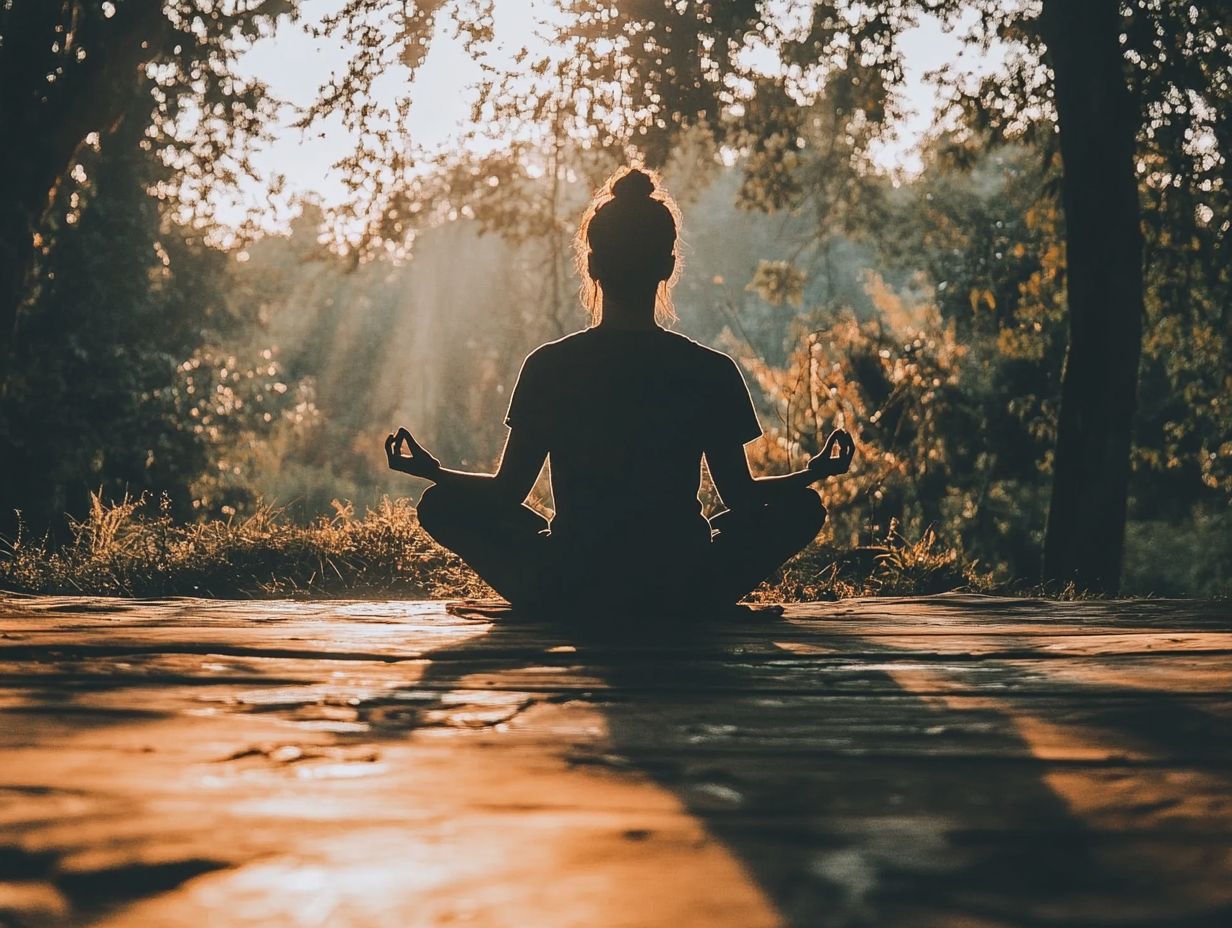
Being mindful significantly enhances your self-control by fostering a deeper awareness of your thoughts and emotions. This enables you to recognize and manage your impulses effectively. Through practices such as meditation and intentional living, mindfulness empowers you to gain a better understanding of your triggers, promoting emotional management and impulse regulation.
This heightened awareness not only strengthens your self-discipline but also cultivates the ability to make conscious decisions that align with your values and goals, aiding in craving management.
For example, when you practice mindfulness, you might suddenly feel a craving for unhealthy snacks. Instead of succumbing to that urge immediately, take a moment to breathe and reflect on the underlying emotions driving that desire. By pausing to evaluate whether you are truly hungry or simply feeling stressed, you empower yourself to make a healthier choice and practice craving management.
Mindfulness also proves invaluable in stressful situations, as it teaches you to observe your emotions without reacting impulsively. This practice enhances your ability to respond thoughtfully rather than emotionally. Over time, these mindful practices build resilience and boost your capacity for self-regulation, leading to improved overall well-being and life balance.
Just imagine the possibilities when you master your impulses! Apply these techniques in your daily life to enhance your discipline and mindfulness.
How Can Mindfulness Help with Overcoming Procrastination and Enhancing Focus?
Mindfulness can serve as a powerful ally in your battle against procrastination, helping you cultivate focus and emotional resilience amidst distractions and self-doubt. By engaging in mindfulness techniques, you can gain a deeper understanding of your motivations and the barriers that hold you back, allowing you to make deliberate choices that resonate with your goals. This enhanced awareness not only curbs the impulse to procrastinate but also fosters the development of healthy habits that promote productivity and personal growth, while also enhancing your decision-making skills.
Incorporating practices such as meditation, mindful breathing, and even yoga can lay a strong foundation for improving your concentration while simultaneously reducing anxiety. Techniques like the ‘5-4-3-2-1’ grounding exercise empower you to identify your surroundings, anchoring you firmly in the present moment. Setting aside dedicated time for reflection through journaling grants you emotional clarity and experiential knowledge, providing valuable insights that enable you to approach tasks without hesitation.
By embracing these practices, you cultivate emotional resilience that equips you to face challenges with confidence, ultimately guiding you toward more constructive choices in both your personal and professional life, fostering positive change along the way.
How Does Mindfulness Improve Focus, Concentration, and Mental Energy?
Mindfulness is your secret weapon for sharpening focus and concentration. By training your mind to remain present and engaged, you enhance your mental energy while minimizing decision fatigue. When you embrace mindfulness practices and self-reflection, you cultivate the ability to direct your attention and immerse yourself in tasks, which is essential for sustaining productivity and reaching your goals.
This approach not only hones your cognitive awareness but also elevates your overall mental performance, laying a strong foundation for both your professional and personal pursuits, including improved sleep quality and communication skills.
Incorporating techniques like deep breathing, meditation, or even brief mindfulness breaks into your day can significantly boost your capacity to concentrate on complex tasks without feeling overwhelmed. For example, just a few minutes dedicated to mindful breathing can clear away mental clutter, providing you with the clarity needed to tackle challenges effectively and maintain a life balance.
Engaging in a body-scan meditation can help uncover areas of tension, promoting relaxation and heightened alertness, ultimately contributing to better mental health and self-improvement.
These techniques not only reduce the effects of decision fatigue by streamlining your thought processes but also enable compassionate action and empower you to make more intentional choices. As a result, you ll find yourself enjoying improved productivity and a healthier mindset.
What Are Some Mindfulness Techniques for Building Discipline?
You have a wealth of mindfulness techniques at your disposal that can significantly enhance your discipline and foster healthy habits, leading to better emotional regulation and cognitive awareness.
Consider practices like mindful breathing, body scan meditation, mindful eating, and visualization.
Each of these approaches helps you develop a deeper awareness of your thoughts, emotions, and behaviors, ultimately strengthening your self-discipline and emotional management, while fostering compassionate living and present moment awareness. By consistently weaving these techniques into your daily routine, you can cultivate a more disciplined lifestyle and elevate your overall mental well-being.
1. Mindful Breathing
Mindful breathing is a fundamental mindfulness practice that invites you to pay attention to your breath, cultivating a deeper awareness of the present moment and enhancing life balance. This technique does more than enhance focus and emotional regulation; it becomes a powerful ally in reducing stress, nurturing inner peace, and improving sleep quality. By weaving mindful breathing into your daily routine, you can develop better impulse control and bolster your self-discipline over time.
Engaging in mindful breathing allows you to cultivate a calmer mental space, serving as an anchor during moments of anxiety or overwhelm. To seamlessly incorporate this technique into your everyday life, start by dedicating just a few minutes each day to focus solely on your breath inhale deeply through your nose, hold for a moment, and exhale slowly through your mouth.
Setting gentle reminders throughout your day can prompt these mindful moments, whether during a coffee break or while commuting. This simple practice supercharges your awareness of the body s responses and enhances your overall emotional resilience, giving you the power to navigate challenges with clarity and intention, fostering positive change.
2. Body Scan Meditation
Body scan meditation is a refined mindfulness technique that invites you to focus one by one on different parts of your body, enhancing your awareness and promoting relaxation. This contributes to better health benefits and forming healthy habits. This practice fosters a profound connection with your physical sensations and nurtures self-reflection, enabling you to manage your emotions more effectively and gain better control over impulses.
As you engage with each area of your body, you can pinpoint stress and tension, allowing you to release negativity and embrace a calmer state of being. With heightened awareness, you may find it easier to confront challenging emotions, leading to improved emotional regulation and better impulse regulation. This meditative approach not only aids in relaxation but also enriches your overall well-being, offering you a more balanced perspective on life.
Those who practice regularly often experience a notable decrease in anxiety levels, paving the way for a healthier and more centered existence.
3. Mindful Eating
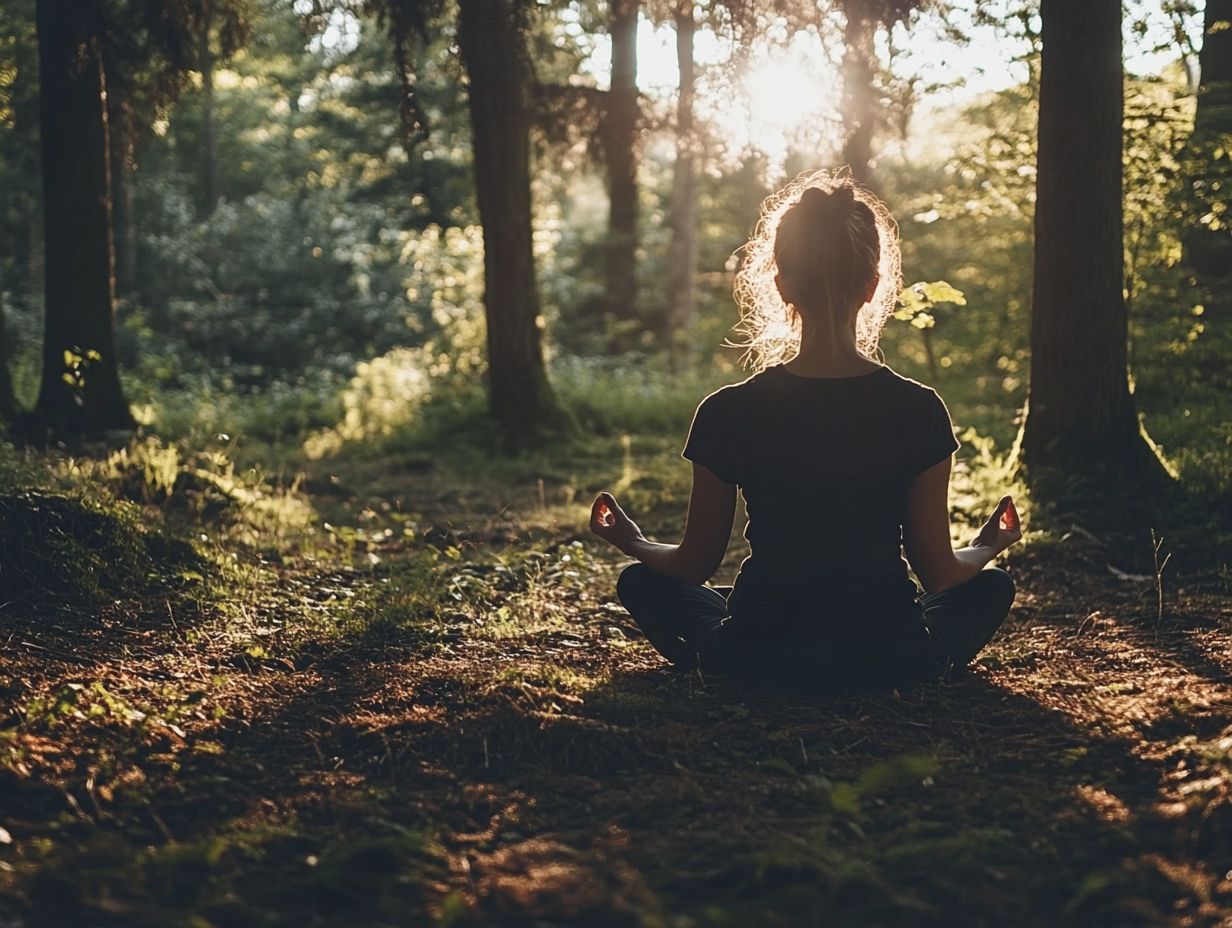
Mindful eating is a transformative practice that invites you to immerse yourself fully in the experience of eating, providing valuable experiential knowledge. By paying attention to the taste, texture, and aroma of your food, you foster a deeper connection to your nutritional choices and enhance your craving management. Cultivating mindfulness during meals can elevate your emotional management, sharpen your focus, and help you develop healthier eating habits, all of which contribute to your overall well-being and self-discipline.
Incorporating mindful eating into your daily routine can revolutionize not only your relationship with food but also inspire healthier lifestyle choices. Don’t wait set aside time now for uninterrupted meals, during which you can focus solely on the flavors and sensations of each bite, free from distractions. Chewing slowly and savoring your food allows you to tune into your satiety signals, which are the body’s signals that indicate when you’re full, helping you avoid overeating and promoting better decision-making.
Creating a serene dining environment perhaps with soft music or calming colors can further enhance your mindfulness. Journaling your thoughts about meals and emotions adds another layer of awareness, enabling you to identify patterns that may lead to emotional eating and fostering self-reflection. This practice nourishes not just your body but also promotes mental clarity and emotional balance, contributing to self-compassion and overall mental energy, making it a truly enriching experience.
4. Visualization
Visualization serves as a potent mindfulness technique that enables you to create vivid mental images of your desired outcomes or goals, significantly boosting your motivation and self-discipline, and contributing to effective goal setting. By picturing your success and the steps required to attain it, you can channel your mental energy and sharpen your focus, making it much easier to navigate challenges and surmount obstacles.
This practice not only enhances your emotional resilience but also strengthens your commitment to achieving your goals through disciplined actions.
Consider athletes who frequently visualize themselves triumphing in competitions. This practice not only hones their focus but also mentally prepares them for real performances. Research demonstrates that this technique can enhance their confidence and self-discipline, crafting a clear roadmap toward success.
Similarly, you can leverage this method in your professional life by envisioning key career milestones. This approach cultivates a proactive mindset and inspires you to take actionable steps toward your aspirations.
Ultimately, visualization fuels your motivation while fostering a deeper sense of mindfulness, paving the way for personal growth and achievement, enhancing communication skills and resilience.
How Can Discipline Enhance Mindfulness?
Discipline enhances your mindfulness by establishing routines and promoting intentional living, crafting an environment ripe for deeper awareness and focus, encouraging compassionate living.
When you cultivate consistent discipline, you find it easier to weave mindfulness practices into your daily life, ultimately leading to improved decision-making and emotional regulation.
By embracing a disciplined approach, you can strengthen your mindfulness skills and foster lasting positive changes that enrich your overall well-being and enhance your spiritual practice. Learning how to use mindfulness for discipline is an excellent way to achieve this.
1. Establishing a Routine
Establishing a routine is essential for cultivating discipline and supporting mindfulness, allowing you to weave mindfulness practices seamlessly into your daily life and improve coping strategies. A structured routine doesn t just foster healthy habits; it also helps you develop emotional resilience and self-discipline. By committing to a regular practice, you can significantly enhance your focus and awareness, setting the stage for personal growth and positive transformation, and encouraging intentional living.
To create an effective routine, start by identifying key moments in your day when mindfulness can be easily integrated, such as your morning rituals or evening wind-downs. Simple techniques like setting specific times for meditation, journaling, or even mindful breathing can anchor your day and provide a sense of stability.
Embracing gradual changes ensures that your routine remains sustainable; starting small makes it easier to build consistency. This disciplined approach not only nurtures a sense of calm but also cultivates an environment that encourages reflection and intentional living, ultimately leading to a greater sense of fulfillment and self-compassion.
2. Setting Goals and Sticking to Them
Setting goals and sticking to them is a crucial practice that enhances your mindfulness, encouraging you to align your actions with your aspirations and values, promoting personal integrity. By intentionally establishing achievable goals, you cultivate willpower and emotional management, reinforcing your commitment to personal growth. This practice not only builds your self-discipline but also deepens your awareness and intention in your daily efforts.
This alignment fosters a stronger sense of purpose, significantly boosting your motivation levels. In this pursuit, it s essential to keep your goals specific, measurable, achievable, relevant, and time-bound.
Integrating mindfulness techniques, such as meditation and reflective journaling, can help you maintain focus on your objectives, reducing distractions and enhancing clarity, contributing to personal growth and self-compassion.
By regularly checking in on your progress, you can adjust your strategies and stay present, reinforcing your resilience and cognitive awareness. Ultimately, intertwining goal setting, discipline, and mindfulness creates a powerful framework for achieving lasting personal transformation and life balance.
3. Practicing Self-Discipline in Daily Activities
Practicing self-discipline in your daily activities is essential for reinforcing mindfulness. It encourages you to approach tasks with intention and awareness, fostering eco-friendly living.
By weaving mindfulness into your everyday routines, you have the opportunity to enhance emotional regulation and cultivate healthier habits that resonate with your values. This contributes to community support and spiritual practice.
This practice strengthens your self-discipline. It also fosters a deeper connection with the present moment, enhancing your overall well-being and promoting emotional well-being.
Start your day with a mindful morning routine. Dedicate just a few minutes to deep breathing or journaling to set a positive tone and cultivate your focus.
During meals, take the time to savor each bite. This mindful eating practice allows you to truly appreciate your nourishment, leading to more conscious eating habits!
Incorporating brief mindfulness breaks throughout your day can effectively manage stress and emotions. This ultimately guides you toward better decision-making.
By embracing small, intentional actions, you can demonstrate the power of self-discipline, paving the way for a life enriched with purpose, clarity, and emotional balance.
Frequently Asked Questions
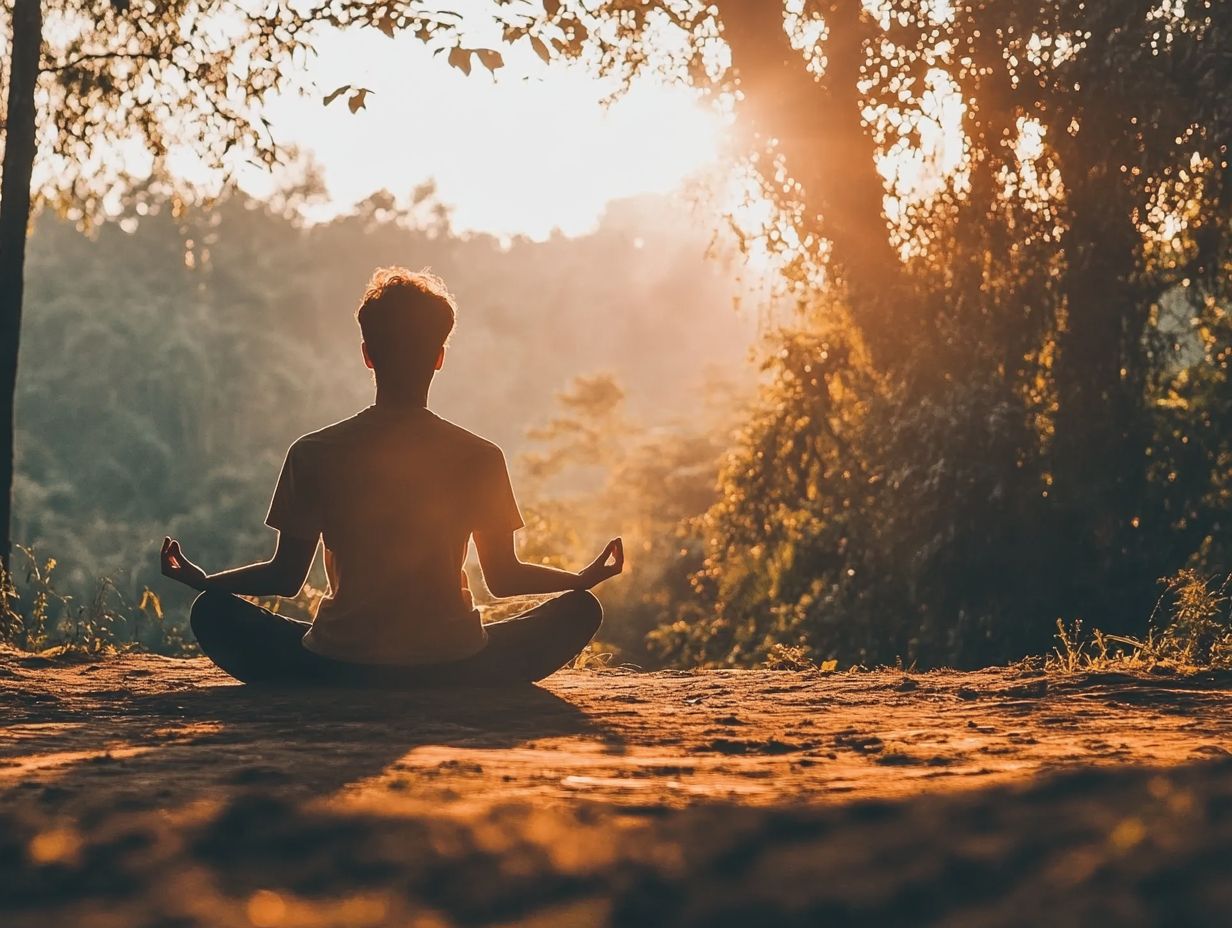
What is the Connection Between Mindfulness and Discipline?
The connection between mindfulness and discipline lies in their shared ability to help individuals gain control over their thoughts, actions, and emotions.
How does mindfulness improve discipline?
Mindfulness teaches individuals to focus on the present moment and to be aware of their thoughts and actions. This can help them make more intentional and disciplined decisions.
Can discipline help with mindfulness?
Yes, discipline can help individuals develop a consistent mindfulness practice by setting aside time each day to practice mindfulness techniques such as meditation or deep breathing.
In what ways can mindfulness and discipline complement each other?
Mindfulness can help individuals become more aware of their habits and patterns. This awareness allows them to make more disciplined choices to break negative habits and create positive ones.
How can the combination of mindfulness and discipline benefit my mental well-being?
The combination of mindfulness and discipline can improve mental well-being by reducing stress and anxiety, increasing focus and productivity, and promoting self-awareness and self-control.
Are there any practical tips for incorporating mindfulness and discipline into daily life?
Some practical tips for incorporating mindfulness and discipline into daily life include setting aside time for daily mindfulness practice, setting specific goals, and creating a plan to achieve them. Be patient and kind to yourself throughout the process.




